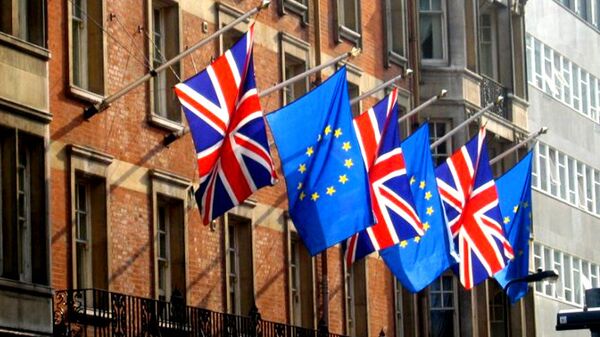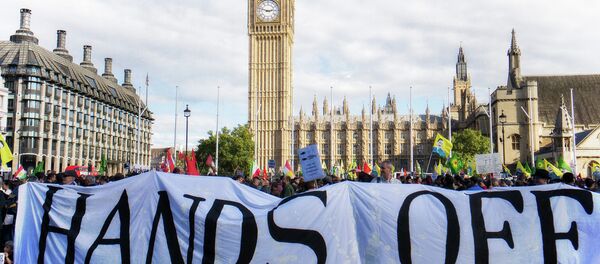Europhiles have long argued that if Britain did leave the EU it would be a disaster. Our trade with other EU members would decrease, and unemployment would rise steeply. Euro-sceptics on the other hand paint a picture of a thriving British economy once the country has been 'set free' from Brussels.
A new report from Open Europe described as 'the most comprehensive study of UK withdrawal' will probably disappoint both Europhiles and Eurosceptics — as it makes it clear that the impact of withdrawal won't be as dramatic as both sides claim.
New poll shows UK staying in an EU with less powers is the most popular option among British voters http://t.co/0RenLThVrY
— Open Europe (@OpenEurope) March 27, 2015
'Worst Case Scenario'
In what the report's authors call 'the worst case scenario' for withdrawal — one in which Britain fails to strike a trade deal with the rest of Europe and does not pursue a 'free trade agenda', GDP could be 2.2% lower in 2030 than if Britain had stayed within the EU. In the 'best case scenario' — one in which the UK does strike a trade deal with Europe and 'opens up fully to trade with the rest of the world,' GDP could be 1.6% higher in 2030.
But the report also says that 'a far more realistic range' is between a 0.8% GDP loss in 2030 and a 0.6% gain.
So in other words, whether we stay in, or leave, it won't have earth-shattering consequences for our economy — and much will depend on what policies we pursue after we leave the EU.
It's worth pointing out that Open Europe is a pro-globalization, economically liberal think-tank not kindly disposed to protectionism. The think-tank has been critical of EU regulation — but also fears the prospect of a post-Brexit UK moving away from liberal, free trade policies. But there is another viewpoint about the policies which we would need to follow after withdrawal.
For the left-wing case for Brexit, we need to look at groups like the RMT-union backed "No2EU- Yes to Democracy". They've called for Britain to 'exit the EU on the basis of socialist policies'.
Prospering post #Brexit isn't impossible for the UK, but it does face some hurdles, see our infographic for details pic.twitter.com/oX98BtNyfm
— Open Europe (@OpenEurope) March 23, 2015
The left-wing case for Brexit is that membership of the EU prevents Britain from following the sort of policies — such as large scale nationalization — which would be needed to remodel our economy along socialist lines. While there's a tendency to think of Euroscepticism as a 'right-wing' cause today, it's worth remembering that the old left of the Labour Party were in the vanguard of the campaign to keep Britain out of the EEC in the 1975 referendum, and that Labour fought the 1983 election on a program of withdrawal from the EEC.
For socialist Eurosceptics, some measure of protectionism would probably be needed if Britain was to prosper having left the EU — and they most certainly would not be in favour of Britain signing up to the TTIP (Transatlantic Trade and Investment Partnership).
The Open Europe report is useful as it highlights the 'difficult choices' that would have to be made post-Brexit.
New Levels of Exposure
Even though they are in favour of 'opening up the UK economy to trade with the rest of the world', Open Europe are honest enough to acknowledge that 'this would mean exposing UK firms and workers to whole new levels of competition from low wage countries'.
And what about immigration? Open Europe tell us that a majority of voters who want us to leave the EU rank limiting the free movement of people as their main motivation. But if we are to leave the EU, and stay competitive in Europe, Open Europe believes we need to 'keep a liberal policy for immigration'. That wouldn't go down well with too many UKIP voters, would it?
The only way to get an EU referendum is to vote Conservative. My video from the European Council in Brussels: https://t.co/JhOIb2JOQ3 #EUCO
— David Cameron (@David_Cameron) March 20, 2015
So the problem is this. Some people want Britain to leave the EU because they believe it's too 'socialist', too interventionist and regulates business too much. Their vision for a post-Brexit Britain is for a deregulated economy, fully open to trade with the rest of the world, and pursuing a reasonably liberal immigration policy.
Others want us to leave the EU because they believe it's too capitalist and prevents socialist policies being adopted.
Their vision for a post-Brexit Britain is for a more interventionist economy, with greater worker and trade union rights — and possibly some protectionist measures to safeguard the British manufacturing industry and protect wage rates from competition from low-wage countries.
Europe exit could cost Britain £56bn a year http://t.co/d7xvNBFeFo #immigration
— UK Immigration News (@uk_immig_news) March 24, 2015
Then there are those who would favour free trade, but want some limits to globalization and tougher immigration controls.
The politicians who govern Britain post-Brexit would need to decide which direction the country goes in after we've said our goodbyes to the EU — and it's going to be hard to please everybody.
Given the hold capital has over the British political system, it's likely that policies we'll follow post-Brexit, will be more friendly to big financial interests, than the interests of ordinary people.
Au Revoir Brussels?
How likely though is Brexit? The Conservatives have already promised to hold, at a date no later than the end of 2017 an 'In/Out referendum' on Britain's EU membership — if, of course, they get re-elected. But even if they don't there's always UKIP — and the possibility, that in a tight election, they could hold the balance of power. And we all know what Nigel Farage will be insisting upon if he indeed is the 'Kingmaker' on May 8. The UKIP leader said in February:
"We will only do a deal with anyone on the condition there is an in/out referendum on the EU."
A poll on 25th March had UKIP on 18%, its best showing since mid-February. The bookmakers, Paddy Power, offer odds of 5-6 that there'll be a vote in favour of Britain leaving the EU by the end of May 2020, and odds of 5-6 that there'll be a vote against Britain leaving the EU by the same date.
UKIP would leave the EU and save in net contributions up to £8 billion per year. Retweet if you agree pic.twitter.com/27qhdSnmW8
— UKIP (@UKIP) March 26, 2015
Regarding a referendum held before 2019, William Hill quote odds of 1-2 for Britain to stay in the EU, and 6-4 for Britain to leave.
It's a tough call to say whether we will get a referendum in the next few years, and if we do, what the result will be. But as Open Europe's report makes clear, even if we do bid 'Au Revoir' to Brussels, some really big decisions still lie ahead.








